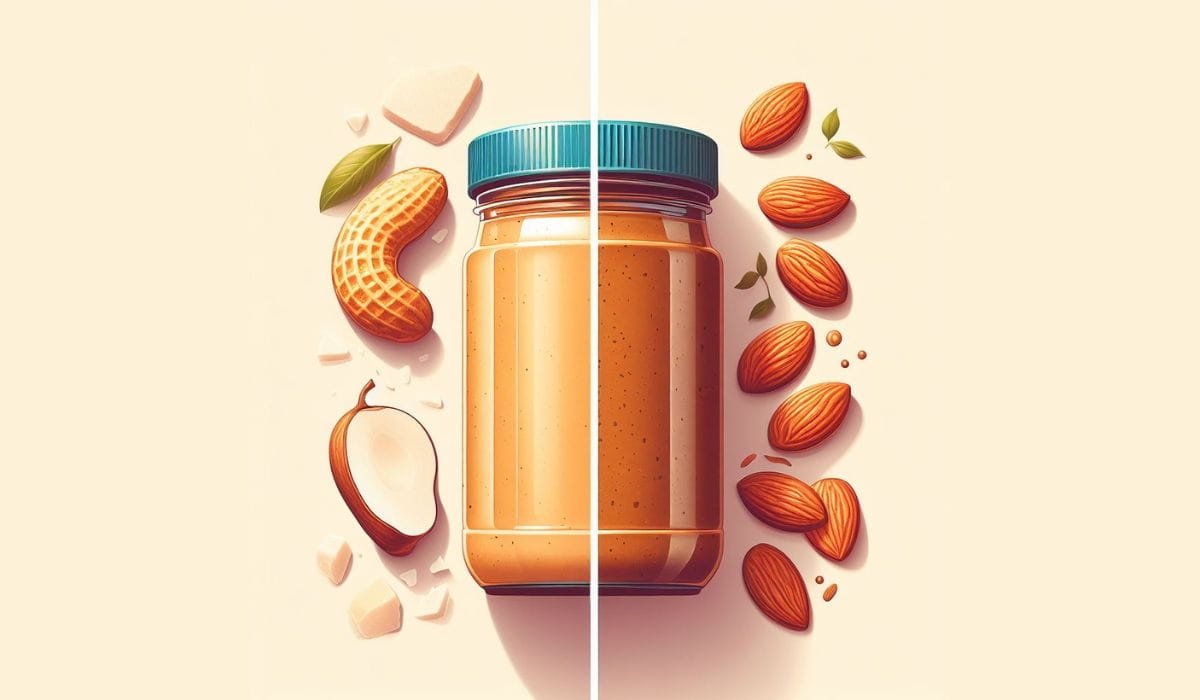Peanut Butter Vs Almond Butter: Which One Is Healthier?

If you are wondering which nut butter is healthier Peanut Butter or Almond Butter, let me tell your right off the bat that Almond butter is generally considered to be the healthier choice between the two.
In this article, you’re going to learn why almond butter is considered to be a healthier choice, about the nutritional differences between peanut butter and almond butter, their respective health benefits, and insights from health experts.
You’ll also get to know the production process of each butter and discuss the various factors you should consider when selecting one for your diet.
By the end of this article, you’ll be equipped with ALL the essential information needed to decide which butter best aligns with your health goals.
IMPORTANT: Throughout the article, I’ve placed numbers in brackets that are linked to scientific paper and trusted resources. I urge you to follow these links (they open in a new window) for fact checking and enriching your health knowledge.
Peanut Butter Vs. Almond Butter: Nutritional Comparison
To be able to choose between almond butter or peanut butter, is crucial to understand their nutritional differences.
I’ve created this comparison table that compare both Peanut Butter’s and Almond Butter’s nutrients. The date for this table where taken from USDA’s website. (almond butter, peanut butter).
| Nutrient (per 100g) | Peanut Butter | Almond Butter |
|---|---|---|
| Calories | 639 | 614 |
| Total Fat | 51.1g (78% DV) | 55.5g (85% DV) |
| Saturated Fat | 10.1g (50% DV) | 6.55g (33% DV) |
| Trans Fat | 0g | 0g |
| Cholesterol | 0mg | 0mg |
| Sodium | 429mg (18% DV) | 227mg (9% DV) |
| Total Carbohydrates | 22.3g (7% DV) | 18.8g (6% DV) |
| Dietary Fiber | 4.8g (19% DV) | 10.3g (41% DV) |
| Sugars | 10.5g | 6.27g |
| Protein | 22.5g (45% DV) | 21g (42% DV) |
| Calcium | 49mg (5% DV) | 347mg (35% DV) |
| Iron | 1.73mg (10% DV) | 3.49mg (19% DV) |
| Magnesium | 169mg (42% DV) | 279mg (70% DV) |
| Phosphorus | 339mg (34% DV) | 508mg (51% DV) |
| Potassium | 564mg (12% DV) | 748mg (16% DV) |
| Zinc | 2.54mg (17% DV) | 3.29mg (22% DV) |
| Copper | 0.42mg (21% DV) | 0.934mg (47% DV) |
| Selenium | 4.1µg (6% DV) | 2.4µg (3% DV) |
| Vitamin C | 0mg | 0mg |
| Thiamin (B1) | 0.138mg (9% DV) | 0.041mg (3% DV) |
| Riboflavin (B2) | 0.191mg (11% DV) | 0.939mg (55% DV) |
| Niacin (B3) | 13.3mg (67% DV) | 3.16mg (16% DV) |
| Vitamin B-6 | 0.444mg (22% DV) | 0.103mg (5% DV) |
| Folate (B9) | 86µg (22% DV) | 53µg (13% DV) |
| Vitamin E (alpha-tocopherol) | 9.11mg (46% DV) | 24.2mg (121% DV) |
Note: The values in the table are based on the provided data, and the recommended daily intake percentages (% DV) are approximate estimates based on a standard daily diet.
Peanut Butter Vs Almond Butter: Commenting on the Nutrients
Given the above, comparison table between Peanut Butter Vs Almond Butter, you can see by yourself why Almond Butter is considered healthier than peanut butter.
Let’s analyze the nutrition table a bit.
Calories
When it comes to calories, almond butter and peanut butter are pretty close contenders.
Peanut butter packs a slightly higher caloric punch at 639 calories per 100g, while almond butter contains 614 calories.
It’s essential to be mindful of portions, especially if you’re watching your calorie intake. Both can be a tasty addition to your diet, but moderation is key.
So, for those of you who want to lose weight, Almond butter is the winner.
Healthy Fats
As for healthy fats, almond butter takes the lead.
With 55.5g of total fat per 100g, it’s richer in monounsaturated fats, which are heart-friendly and has less saturated fats which are bad for your heart. [1]
Peanut butter, with 51.1g of total fat, also offers a good dose of healthy fats, but the almond variety edges ahead in this healthy fats duel.
Almond is the clear winner here.
Vitamins
As for the vitamin content found in almond butter and peanut butter, both spreads have their unique strengths.
Peanut butter boasts a higher Vitamin E content at 9.11mg, contributing to antioxidant support.
Almond butter, on the other hand, shines in Vitamin B2 (Riboflavin) with a substantial 0.939mg, crucial for energy metabolism. Including both in your diet can offer a balanced mix of these essential vitamins.
If we take the number of vitamins in the table above, we can see that out of the 7 vitamins, peanut butter has a higher count in 4 of them, almond butter in 2 of them and they have a tie in 1 of them (vitamin C).
For me, Peanut butter is the winner in this duel.
Minerals
In the mineral “department”, almond butter stands out with higher levels of calcium, magnesium, and copper.
It packs a hefty 347mg of calcium, promoting bone health, and 279mg of magnesium, vital for various bodily functions.
Peanut butter, while offering respectable amounts, falls slightly behind in these specific minerals.
Almond butter literally crushes Peanut butter in terms of mineral content.
Protein
Protein, a crucial building block for muscle and tissue repair, is a significant factor when comparing peanut butter and almond butter.
Peanut butter takes the lead in this area, offering 22.5 grams of protein per 100g.
Almond butter, while not far behind at 21g, doesn’t quite match the protein punch of peanut butter.
If you’re aiming to up your protein intake, peanut butter is a better source of protein. It has 1.5g more protein than almond butter per 100 grams.
Winner: Peanut Butter.
Fiber
Fiber plays a crucial role in digestion and overall gut health.
Almond butter takes the fiber crown with a robust 10.3g per 100g, offering more than double the fiber content of peanut butter at 4.8g.
Including almond butter can be a delicious way to enhance your dietary fiber intake and support a healthy digestive system.
Winner: Almond Butter.
Carbohydrates
Both butters provide a moderate amount of Carbohydrates.
Peanut butter has 22.3g of carbohydrates per 100g, while almond butter has slightly less at 18.8g. These carbs come with beneficial nutrients, so adding either into your diet can provide sustained energy, but as always, it’s wise to be mindful of overall carbohydrate intake.
Moreover, the carbs in almond butter are accompanied by a higher content of dietary fiber compared to peanut butter.
This means that the net carbs (total carbs minus fiber) are lower, which can be beneficial for blood sugar control and satiety.
Winner: Almond Butter
Sugars
Keeping an eye on sugar intake is crucial for many, and in this aspect, peanut butter has a higher sugar content at 10.5g per 100g, compared to almond butter’s 6.27g.
Opting for almond butter is a better choice for those of you aiming to minimize sugar intake while still enjoying the rich, nutty flavor.
Winner: Almond Butter
Final Score:
- Peanut Butter: 2
- Almond Butter: 6
Final Verdict: Almond Butter is healthier
How Nut Butters Are Made?
You’ll find that the production of nut butter involves a straightforward yet meticulous process, beginning with the thorough cleaning and sorting of the nuts.
In some cases, nuts arrive at the factories already cleaned and sorted.
Anyway, here’s what happens next:
- Roasting: Nuts are gently roasted to bring out their rich flavors and aromas, a step that also makes the removal of skins easier for a smoother consistency.
- Cooling: After roasting, the nuts are cooled to room temperature. This is important to prevent the nuts from overheating and becoming oily.
- Blanching: The skins are then removed from the nuts, either by hand or by a machine. This step is not always necessary, but it can give the nut butter a smoother texture.
- Grinding: The prepared nuts are then ground. This stage transforms them into a paste, and it’s important to regularly scrape the sides to ensure an even texture.
- Mixing: Additional ingredients like salt or oil may be mixed in to enhance taste and extend shelf life before the nut butter is carefully packaged (although I highly recommend to avoid brands that add potentially harmful ingredients into the mix).
- Packaging: The nut butter is then packaged in jars or containers. The jars or containers are typically sterilized to prevent the growth of bacteria.
This production method ensures that the natural nutrients of the nuts are retained, providing you with a wholesome spread.
Are Nut Butters better than eating nuts in their physical form?
While nut butters offer convenience and a creamy texture, eating nuts in their whole form may lead to better fat management and weight control – according to accredited nutritionist, Catherine Saxelby. [2]
She continues by saying that whole nuts, thanks to their fibrous structure, trap natural oils, causing you to excrete more fat—about 5-15%—in your stools.
This natural oil isn’t fully absorbed by your body, aiding in weight management. On the other hand, when you consume nut butters, the grinding process increases fat absorption since less fat is excreted.
While nut butters aren’t to be completely avoided—especially as they can reduce the risk of type 2 diabetes—their consumption should be moderate. [3]
What The Science Says About Peanut butter and Almond Butter?
Now let’s take a look what the science is saying about peanut butter and almond butter.
Peanut Butter
Peanut butter, in particular, offers a range of bioactive compounds that have been shown to provide health benefits:
- Peanuts are rich in proteins and fibers, which can aid in satiety and digestive health. [4]
- They contain antioxidants, such as resveratrol and phytosterols, that are thought to help prevent diseases. [5]
- Processing methods like roasting can enhance the concentration of these beneficial compounds. [5]
It’s worth noting that peanuts also include heart-friendly fats and are a source of Co-enzyme Q10, vitamins, and minerals, all contributing to a well-rounded diet. [5]
TIP: When choosing peanut butter, consider the type and extent of processing, as this can affect the nutritional value.
Almond Butter
Almond butter generally contains more vitamins, minerals, and fiber, and may be an even better choice for those looking to lower their cholesterol levels.
Studies have demonstrated that almonds, whether in butter form or whole, can significantly reduce low-density lipoprotein (LDL) cholesterol, which is often referred to as the ‘bad’ cholesterol. [6]
While raw and roasted almonds were shown to lower total serum cholesterol, almond butter’s effects weren’t as pronounced but still beneficial.
Additionally, almond butter slightly increased high-density lipoprotein (HDL), known as the ‘good’ cholesterol. [6]
This evidence suggests that incorporating almond butter into a heart-healthy diet could contribute to better cardiovascular health, alongside other plant-based foods. [6]
What The Critics Say About Nut Butters?
Critics often highlight that both peanut and almond butters can come with health concerns, such as added sugars and potential toxins. When choosing between these spreads, you might want to consider the following:
- Saturated Fat and Sodium: Peanut butter contains saturated fats and often has more sodium than potassium, which could be a concern for heart health if consumed in large amounts. [7]
- Aflatoxins: Peanuts can be contaminated with aflatoxins, which are produced by certain fungi and can be harmful if ingested frequently over a long period. [8]
- Pasteurization and Additives: Almond butter’s pasteurization process may involve chemicals like propylene oxide, and commercial varieties often include unnecessary additives, from sweeteners to emulsifiers. [9]
Understanding these points helps you make an informed choice regarding which nut butter best fits your dietary preferences and health objectives.
What to be aware before buying Nut Butters?

Before you add a jar to your shopping cart, it’s crucial you “scrutinize” the label for unwanted ingredients like added oils and sugars that can detract from the nut butters’ nutritional benefits.
Watch out for additives such as soybean oil, vegetable oil, white sugar, corn maltodextrin, monoglycerides, and diglycerides. These can undermine the healthful qualities of the nut butters by introducing unnecessary fats and sugars.
Conservatives and preservatives may also be present. Reading the label is essential; it’s your tool for making an informed choice.
Also, consider sourcing nut butters made from nuts grown in your own country to support local agriculture and potentially reduce your carbon footprint.
Benefits of eating Peanut Butter and Almond Butter

By know you should have understood that you’ll get numerous health benefits by adding peanut butter or almond butter into your diet.
Both are rich in nutrients that can contribute positively to your health. Here’s how they can support your well-being:
- Heart Health: These butters are packed with monounsaturated fats, which can lower unhealthy LDL cholesterol levels, potentially reducing the risk of heart disease.
- Weight Management: High in protein and fiber, they can promote satiety, helping to control appetite and support weight maintenance.
- Blood Sugar Control: With a low glycemic index, they can help maintain stable blood sugar levels, which is particularly beneficial for individuals with diabetes or those looking to manage their energy levels throughout the day.
Choose these nut butters as part of a balanced diet for their health-promoting properties.
Frequently Asked Questions
The Verdict: Almond Butter vs. Peanut Butter
So there you have it: Peanut Butter Vs Almond Butter. Both offer valuable nutrients, but Almond butter is slightly healthier than Peanut Butter (but more pricey).
Almond butter generally contains more vitamins, minerals, and fiber, which can be beneficial if your diet lacks these nutrients. However, it’s also typically higher in calories and fat.
Peanut butter, while slightly lower in nutrients, is richer in protein and often more affordable, making it a practical choice for muscle building and budget-conscious eating.
Ultimately, neither is definitively healthier; it comes down to personal preference and nutritional needs. Balance and moderation are key, so you might even choose to enjoy both in your diet.
What do you think is healthier? Leave your feedback below and let’s start a conversation.
